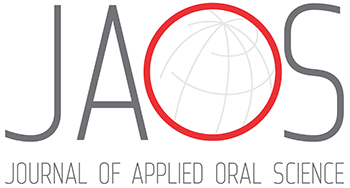Abstract
Tissue bioengineering has been applied to Endodontics to seek a more biological treatment. The presence of blood vessels is crucial for cell nutrition during tissue formation.
Objective
This study analysed the application of vascular endothelial growth factor (VEGF) in the angiogenesis of mature root canals.
Material and methods
Upper first molars of twelve 13-week old Wistar male rats were used. The root pulp of the mesiobuccal canal was removed and the root canal instrumented with K-files up to size #25. Periapical bleeding was induced into the root canal by introducing a #15 K-file beyond the apex. The teeth on the right side of the arch were filled up with blood clot (G1), whereas those on the left side were filled up with blood clot plus 50 ng/ml of VEGF (G2). Teeth were sealed with light-curing glass-ionomer cement and the animals were sacrificed after 60 days. The maxilla was dissected and fixed before obtaining serial sections for histological processing with haematoxylin-eosin (HE) and immunohistochemical factor-VIII. Immunohistochemical labelling was evaluated using scores for statistical analysis.
Results
Immunohistological analysis demonstrated the presence of angiogenesis in both groups, but with higher angiogenic maturation in G2 during the experimental period (p<0.05). HE staining showed connective tissue with absence of odontoblasts in all specimens.
Conclusions
It can be concluded that it is possible to obtain angiogenesis in mature root canals with or without the use of VEGF, although the latter tends to accelerate blood vessel formation.
Keywords
Angiogenesis; Vascular endothelial growth factor; Endodontics




